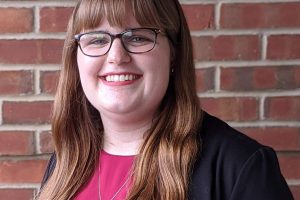
Alycen Wiacek, a doctoral candidate in the Department of Electrical and Computer Engineering (ECE), was recently named a scholar for the Metropolitan Washington Chapter of the Achievement Rewards for College Scientists (ARCS) Foundation. The one-year scholarship starts during the fall 2021 semester.
“This award puts me in a unique and elite group of scientists and researchers with multidisciplinary research expertise,” Wiacek said. “Association with the ARCS Foundation further provides an opportunity to contribute as well as inspire the next generation of scientists and engineers through mentorship of future ARCS scholars.”
ARCS is a national, nonprofit volunteer women’s organization comprising 15 chapters that have provided more than 17,000 scholar awards totaling over $110 million to recipients at 54 universities since its founding in 1958. A typical year sees the Metropolitan Washington Chapter of ARCS give out three scholar awards to students at its member schools, which includes JHU, University of Maryland, George Washington University, Georgetown University, and University of Virginia.
Wiacek was selected for the scholarship because of her research, the bulk of which focuses on developing new algorithms that will aid radiologists in diagnosing breast cancer. Ultrasound scanners use high-frequency sound waves to create images of the inside of the body. These images are traditionally created by processing the received sound waves in a simple manner. Instead of using that traditional approach, Wiacek’s research looks to process those signals in alternate ways – by using advanced signal processing and machine learning techniques – to create different types of images that help radiologists in their decision-making, such as whether a suspicious breast mass is a fluid-filled cyst that can be disregarded or a solid cancerous mass that needs to be biopsied.
“Breast cancer, in particular, hits very close to home for me and my family, so anything that I can do to improve the ability of doctors to diagnose breast cancer early is incredibly motivating,” Wiacek said. “Breast cancer is a terrible disease that has touched everyone in some way or another. It has also been proven that early detection can drastically improve outcomes, so I think advanced imaging methods are the future of improving patient care and reducing the impact breast cancer has on all of our lives.”
Wiacek, who is a member of the Photoacoustic and Ultrasonic Systems Engineering Laboratory (PULSE Lab), led by ECE Assistant Professor Muyinatu Bell, credits coming to Hopkins as being “instrumental in [her] ability to pursue this research.” She is particularly grateful for her relationship with Bell.
“Dr. Bell is a pioneer in our field and with her guidance and mentorship we have published multiple papers in top journals and have a pending patent on our work together,” Wiacek said. “In addition, the clinical connections that exist at Hopkins are outstanding. I am very fortunate to work with world-class radiologists and surgeons at the Johns Hopkins Hospital who provide key insights to our studies.”